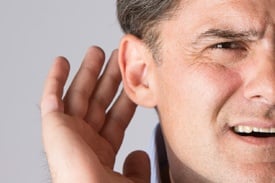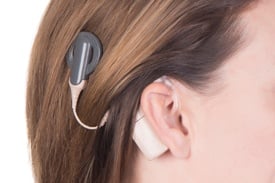Infant hearing loss affects approximately 2-3 out of 1,000 live births (NIDCD).
Causes & Treatment of Infant Hearing Loss
Tags: Audiology, Hearing, Hearing Loss Prevention, Support, Hearing Loss
Infant/Toddler Hearing Checklist
As of July 2004, all babies born in the state of Ohio receive a free hearing screening before they go home from the hospital. The Universal Newborn Hearing Screening (UNHS) legislation has been helpful in detecting hearing loss sooner and allowing families to begin helping their babies earlier. Typically, hearing is tested at birth, and, if it’s normal, is not tested again until approaching age 4. This usually takes place on a visit to the pediatrician. Hearing is screened again when the child enters school. Many schools then alternate between vision and hearing screenings during the school-age years.
Tags: Speech, Audiology, Communication, Hearing, Hearing Loss Prevention, Support
What is Hearing Loss?
Impairments in hearing can happen in either frequency (the high or low pitch of a sound) or intensity (the volume of a sound), or both. For example, a person may not be able to hear very high-pitched noises like a whistle, or they may not be able to hear the TV unless the volume is turned up – or both. Hearing loss severity is based on how well a person can hear the frequency or intensities most often associated with speech. Severity can be described as mild, moderate, sever, or profound. Hearing loss can be congenital (occurring from the time of birth) or acquired (developing later in life after a period of normal hearing). Hearing loss can affect one or both ears – and in different degrees of severity in each ear. A loss that affects one ear is called a “unilateral” (one-sided) hearing loss. A loss that affects both ears is called a bilateral (two-sided) hearing loss.
Tags: Audiology, Hearing Aids, Hearing, Hard of Hearing, Hearing Loss
Assistive Listening Devices Can Boost Your Hearing
When your hearing aids do not provide enough help in certain environments, or if you don’t wear hearing aids but need help hearing only in certain situations, you may want to consider an assistive or alerting device. Discuss with your audiologist which devices might be helpful to you. At CHSC, we offer a variety of devices and can you determine which is right for you.
Tags: Audiology, Hearing Aids, Communication, Hearing, Hearing Loss
How Hearing Works
The outer ear is what most people consider “the ear.” It consists of a flap of skin/cartilage (called the pinna or auricle) on the outside of the head. It collects sound and directs it into the ear canal. The ear canal is a closed tube with hairs and “wax glands” in the outer portion. Our ear canal is self-cleaning. The wax glands produce wax, or cerumen, and the tiny hairs push the wax out of our ears. As the wax moves out of the ear, it cleans the ear canal and keeps unwanted critters, such as insects, out of the ear. At the end of the ear canal is the eardrum, or tympanic membrane. When air moves it creates vibrations. These sound vibrations are collected by the pinna and directed into the ear canal, to the eardrum, causing it to vibrate just like the head of a drum when you hit it with a drumstick. When an audiologist or physician looks into a healthy, unobstructed ear with an otoscope, s/he can see the outer surface of the eardrum.
Tags: Audiology, Communication, Hearing, Hearing Loss
What is Auditory Processing and How Does it Work?
Auditory processing is basically how hearing works between the ear and the brain. It consists of a specific set of skills that most of us perform without any difficulty – or awareness. These include:
What is the Difference Between a Cochlear Implant and a Hearing Aid?
Hearing aids and cochlear implants are both electronic devices that help improve hearing. How they do that is what makes them very different.
Tags: Hearing Aid, Audiology, Hearing Aids, Hearing, Deaf, Hard of Hearing
What is a Cochlear Implant?
A cochlear implant is a small, surgically implanted electronic device that can help to provide access to sound to people with severe to profound hearing loss and those who cannot hear or understand speech with hearing aids. While hearing aids make sound louder, cochlear implants directly stimulate the nerve fibers in the inner ear (cochlea). An implant does not create normal hearing; instead, under the appropriate conditions, it can give a deaf individual useful auditory understanding of speech and environmental sounds.
Tags: Hearing Aid, Audiology, Hearing Aids, Hearing, Deaf, Hard of Hearing
Say Goodbye to Batteries! Introducing: Rechargeable Hearing Aids
One of the top complaints of those who wear hearing aids centers around batteries. Batteries typically last for three days to two weeks depending on the size of the battery, the type of hearing loss, and the size and type of the hearing aid. Batteries can be expensive to purchase. In addition, for those with limited mobility in the hands, arthritis or tingling or numbness in the fingertips, or low vision, changing the batteries can be difficult or impossible. There is now an alternative to changing hearing aid batteries so often: rechargeable hearing aids!
Tags: Hearing Aid, Audiology, Hearing Aids, Hearing, Hearing Loss
Hearing Loss: Be Your Own Self-Advocate
Self-advocacy encompasses learning how to speak up for yourself. It involves surrounding yourself with individuals that will support you in your journey, being knowledgeable regarding your rights, and being able to voice your rights to others. Advocating for yourself will not only lead to success in life, but it will help break down barriers and educate others about hearing loss. Living with a disability presents challenges, but fear not - with the appropriate support systems, strategies, and knowledge, you can learn to improve your quality of life.
Tags: Audiology, Communication, Hearing, Support, Hearing Loss
















